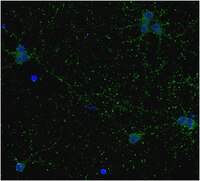MAB5406B Sigma-AldrichAnti-GAD67 Antibody, clone 1G10.2, Biotin Conjugate
This Anti-GAD Antibody, clone 1G10.2, Biotin Conjugate is validated for use in IHC for the detection of GAD67. See below for more information about this anti GAD antibody.
More>> This Anti-GAD Antibody, clone 1G10.2, Biotin Conjugate is validated for use in IHC for the detection of GAD67. See below for more information about this anti GAD antibody. Less<<Recommended Products
Overview
| Replacement Information |
|---|
Key Spec Table
| Species Reactivity | Key Applications | Host | Format | Antibody Type |
|---|---|---|---|---|
| H, M, R | ICC, IHC | M | Biotin | Monoclonal Antibody |
| References |
|---|
| Product Information | |
|---|---|
| Format | Biotin |
| Control |
|
| Presentation | Purified mouse monoclonal IgG2a conjugated to Biotin in PBS with 0.1% sodium azide and 15 mg/mL BSA. |
| Quality Level | MQ100 |
| Physicochemical Information |
|---|
| Dimensions |
|---|
| Materials Information |
|---|
| Toxicological Information |
|---|
| Safety Information according to GHS |
|---|
| Safety Information |
|---|
| Storage and Shipping Information | |
|---|---|
| Storage Conditions | Maintain refrigerated at 2-8 °C in undiluted aliquots for up to 6 months from date of receipt. |
| Packaging Information | |
|---|---|
| Material Size | 100 µL |
| Transport Information |
|---|
| Supplemental Information |
|---|
| Specifications |
|---|
| Global Trade Item Number | |
|---|---|
| Catalogue Number | GTIN |
| MAB5406B | 04053252647765 |
Documentation
Anti-GAD67 Antibody, clone 1G10.2, Biotin Conjugate SDS
| Title |
|---|
Anti-GAD67 Antibody, clone 1G10.2, Biotin Conjugate Certificates of Analysis
| Title | Lot Number |
|---|---|
| Anti-GAD67, clone 1G10.2, Biotin - 3218869 | 3218869 |
| Anti-GAD67, clone 1G10.2, Biotin - 3244044 | 3244044 |
| Anti-GAD67, clone 1G10.2, Biotin - 3482212 | 3482212 |
| Anti-GAD67, clone 1G10.2, Biotin - 3660430 | 3660430 |
| Anti-GAD67, clone 1G10.2, Biotin - 3773132 | 3773132 |
| Anti-GAD67, clone 1G10.2, Biotin - 3786050 | 3786050 |
| Anti-GAD67, clone 1G10.2, Biotin - 3807971 | 3807971 |
| Anti-GAD67, clone 1G10.2, Biotin - 3876259 | 3876259 |
| Anti-GAD67, clone 1G10.2, Biotin - 3906986 | 3906986 |
| Anti-GAD67, clone 1G10.2, Biotin - 4047586 | 4047586 |















